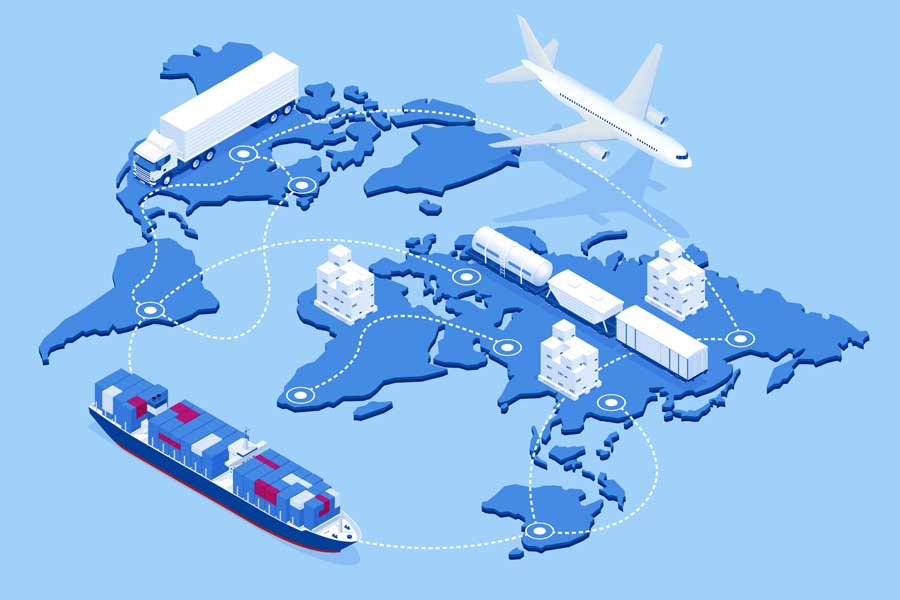Developing a lean supply chain depends on your business’ ability to adapt to the changing world around you and optimise your logistics strategy wherever possible. Ultimately, it’s all about reducing waste: whether the waste be excess packaging, unnecessary costs, or delays to your imports and exports.
Being sloppy with your logistics and supply chain management will end up costing your business money – it’s that simple. From losing clients as a result of delayed deliveries or seeing warehousing costs skyrocket due to poor planning, keeping your supply chain lean is part and parcel of being a well-optimised business.
So, how can you start to develop a lean supply chain and spot areas that are suitable for further optimisation? In this article, we’ll dive into some of the most commonly neglected logistical areas so that your business can start to better analyse and optimise your supply chain.
Read on to learn more or contact our experienced team if you require any support with logistics and supply chain management.
Improving Your Logistics and Supply Chain Management
Analyse Your Warehousing
Warehousing your goods costs you valuable space and money, so making storage times as brief as possible is the most obvious way to reduce your costs. But, there’s a lot more to it than that; with the potential for optimisation often depending on whether you have your own storage space or rely on the assistance of a warehousing facility.
Start by examining how well you are making use of the space you have available. Look at whether you can start moving your existing pallets vertically, if weight restrictions allow it, rather than creating new ones. If your business works with a third-party that offers warehousing, such as Smart Directions, this can really help you to streamline costs and reduce the size of your business premises.
As mentioned, keeping your goods in stasis within a warehouse is wasting time and costing you money. So, examine how your business can reduce the number of steps needed to transport your products to or from your business.
Simplify or Outsource
Simplify your processes and cut out unnecessary steps in your supply chain and logistics management strategy. If you depend on an external warehousing facility, make sure that it is located to optimally support your import and export requirements – close to a major road and air network if possible.
But, don’t be afraid to outsource your logistics management to help keep developing a lean supply chain. Businesses like Smart Directions have been working within the logistics sector for decades, meaning you’ll be able to focus on other aspects of your business without having to deal with the added complications of your warehousing, customs clearance, and import and export planning.
Utilise Dependable Technology
Having the right technology at your disposal can be a real game changer in helping your business optimise its logistics and supply chain management strategy. There are all kinds of existing technologies to utilise at this moment in time, as well as AI, autonomous vehicles, drones, blockchain, and more to look forward to in the future. But, for now:
- Logistics and supply chain management software will allow you to quickly find the best modes of transportation and prices to suit your shipping requirements.
- Shipment tracking systems will enable you and your customers to stay fully informed about every shipment with real-time updates throughout its journey.
- Emerging startups are now providing the logistics industry with essential real-time data on everything from weather and traffic disruption to road and port conditions.
- Predictive analytics can help your business to anticipate a higher demand for your goods before your clients place an order.
Every business is different, but you’ll go further with dependable logistics and supply chain management technology, such as like Smart Direction’s Metafour software suite. To help our clients get the most out of our state-of-the-art software, we also provide a full training programme.
Stay Ahead of Your Customs Clearance Obligations
Customs clearance requires detailed planning and meticulous accuracy. Without it, your imports and exports will undoubtedly experience delays. To ensure your shipments arrive on time, you’ll need to accurately classify your tariffs, reduce your import duty rates, and include any relevant documentation. For most businesses, it’s easier to outsource these duties to a seasoned customs broker or employ a specialist to help you meet all of your import and export obligations.
Adapt to Overcome Brexit
Brexit is coming and business have to adapt in order to maintain or develop a lean supply chain. As Brexit and its consequences are totally fluid at this moment in time, it’s very difficult to provide long-term advice for businesses. However, there are some things your business can do in order to prepare for every outcome post trade negotiation. Visit our dedicated Brexit News page to stay fully up to date on everything Brexit related and learn how your business can make changes now to prepare for the future.
To speak with our team about developing your lean supply chain strategy or for anything logistics related, please contact us now.

